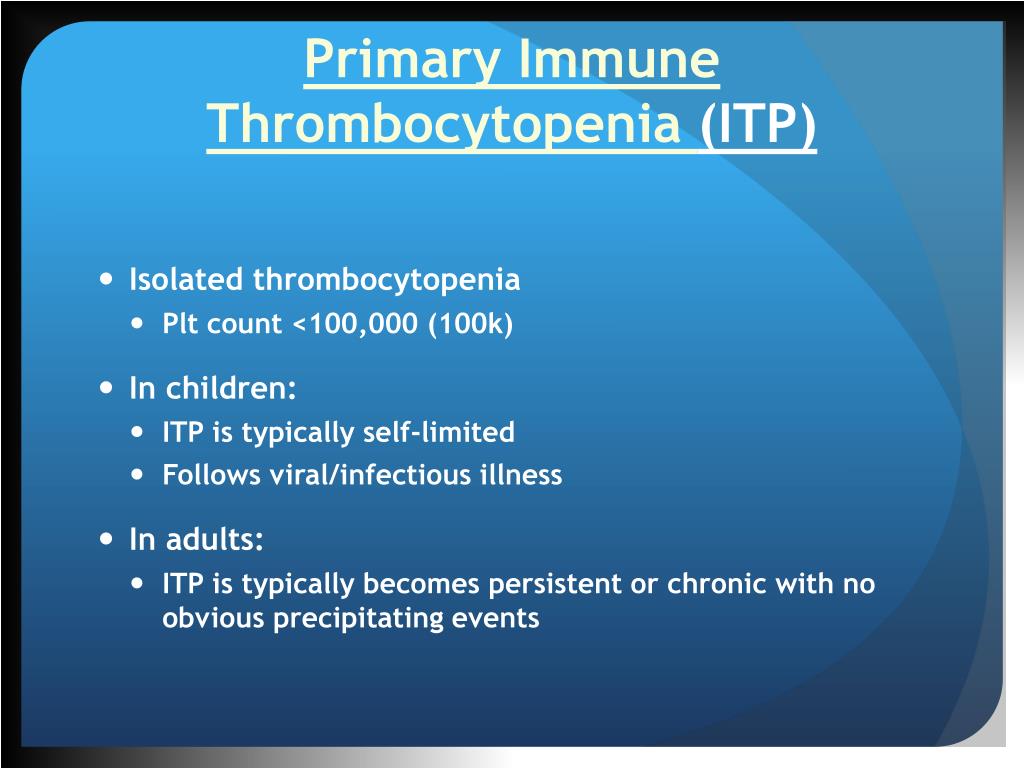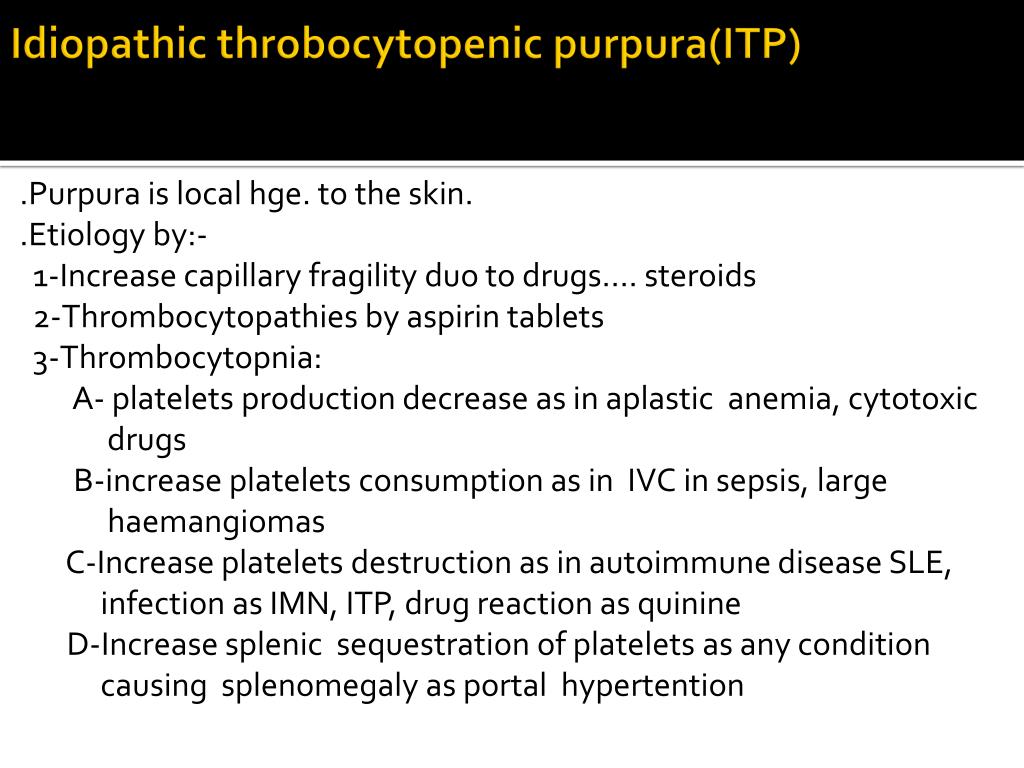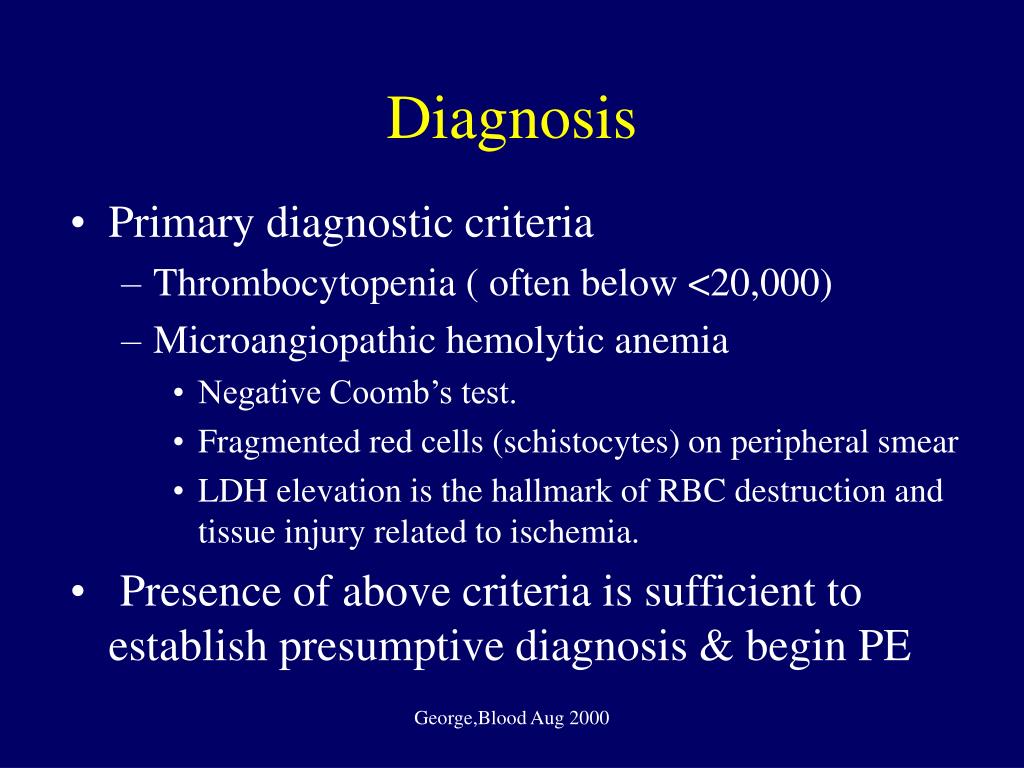
THE SEVERITY OF THROMBOCYTOPENIA AND ETIOLOGY DISTRIBUTION Download Table
The ICD code D69 is used to code Purpura. Purpura is a condition of red or purple discolored spots on the skin that do not blanch on applying pressure. The spots are caused by bleeding underneath the skin usually secondary to vasculitis or dietary deficiency of vitamin C (scurvy). They measure 0.3-1 cm (3-10 mm), whereas petechiae measure.

PPT MANAGEMENT OF PATIENTS WITH THROMBOCYTOPENIA PowerPoint Presentation ID2272137
Overview. Immune thrombocytopenia (ITP) is an illness that can lead to bruising and bleeding. Low levels of the cells that help blood clot, also known as platelets, most often cause the bleeding. Once known as idiopathic thrombocytopenic purpura, ITP can cause purple bruises. It also can cause tiny reddish-purple dots on the skin that look like.

Realworld evidence on clinical in immune thrombocytopenia treated with thrombopoietin
A platelet count that falls below the lower limit of normal, i.e., 150000/microliter (for adults) is defined as thrombocytopenia. Platelets are blood cells that help in blood clotting and wound healing — risks associated with thrombocytopenia range from no risk at all to bleeding risks and thrombosis. The correlation of severity of thrombocytopenia and bleeding risk is uncertain. Spontaneous.

Thrombocytopenia Workup Algorithm A common consult GrepMed
Thrombocytopenia means you have fewer than 150,000 platelets per microliter of circulating blood. Because each platelet lives only about 10 days, your body normally renews your platelet supply continually by producing new platelets in your bone marrow. Thrombocytopenia rarely is inherited; or it can be caused by a number of medications or.

PPT Idiopathic throbocytopenic purpura (ITP) PowerPoint Presentation ID3051924
ICD-10 code D69.6 for Thrombocytopenia, unspecified is a medical classification as listed by WHO under the range - Diseases of the blood and blood-forming organs and certain disorders involving the immune mechanism .

Thrombocytopenia Differential Diagnosis
Immune thrombocytopenia happens when your immune system clears your platelets from circulation and your platelet level goes down. In some cases, ITP goes away on its own or with treatment. Other times, immune thrombocytopenia is a chronic condition, which means symptoms can be treated, but not cured. People with chronic ITP may need treatment.

Classification of inherited thrombocytopenias according to Download Table
Thrombocytopenia, unspecified Billable Code. D69.6 is a valid billable ICD-10 diagnosis code for Thrombocytopenia, unspecified . It is found in the 2024 version of the ICD-10 Clinical Modification (CM) and can be used in all HIPAA-covered transactions from Oct 01, 2023 - Sep 30, 2024 . ↓ See below for any exclusions, inclusions or special.

Thrombocytopenia Medicine
Search Results. 172 results found. Showing 1-25: ICD-10-CM Diagnosis Code D69.6 [convert to ICD-9-CM] Thrombocytopenia, unspecified. Acquired thrombocytopenia; Thrombocytopenia (low blood platelets); Thrombocytopenic disorder. ICD-10-CM Diagnosis Code D69.42 [convert to ICD-9-CM] Congenital and hereditary thrombocytopenia purpura.

Icd10cm Code For Idiopathic Thrombocytopenia
D69.6 is a billable diagnosis code used to specify a medical diagnosis of thrombocytopenia, unspecified. The code is valid during the current fiscal year for the submission of HIPAA-covered transactions from October 01, 2023 through September 30, 2024. Unspecified diagnosis codes like D69.6 are acceptable when clinical information is unknown or.

Thrombocytopenia Medicine
People with mild immune thrombocytopenia might need only regular platelet checks. Children usually improve without treatment. Most adults with ITP will need treatment at some point. The condition often gets worse or lasts long, also known as chronic. Treatment might include medicines to increase platelet count or surgery to remove the spleen.

ITP Idiopathic Thrombocytopenic Purpura Health Life Media
ICD-10 code lookup — find diagnosis codes (ICD-10-CM) and procedure codes (ICD-10-PCS) by disease, condition or ICD-10 code. Search About 44 items found relating to thrombocytopenia

Immune Thrombocytopenia CFCH Centre for Clinical Haematology
Thrombocytopenia, unspecified. D69.6 is a billable/specific ICD-10-CM code that can be used to indicate a diagnosis for reimbursement purposes. The 2024 edition of ICD-10-CM D69.6 became effective on October 1, 2023. This is the American ICD-10-CM version of D69.6 - other international versions of ICD-10 D69.6 may differ.

References in Thrombocytopenia Medicine
This site is dedicated exclusively to helping you look up ICD-10 codes, quickly access the codes you use most, and become more comfortable with the new code set in general. No ads, no spam, and it's free for everybody.. ICD-10 D69.6 - Thrombocytopenia, unspecified Chapter 3 Section D65-D69 D69.6 ICD-10 Billable. Thrombocytopenia, unspecified

Icd 10 Code For Thrombocytopenic Disorder
Gestational Thrombocytopenia ICD 10. Thrombocytopenia is a medical term for a low platelet count in the blood. Platelets are low in around 10% of pregnancies. The most common cause is gestational Thrombocytopenia, a harmless condition.

Icd 10 Code For Acute On Chronic Thrombocytopenia
ICD-10-CM Diagnosis Code D75.829. Heparin-induced thrombocytopenia, unspecified. 2023 - New Code 2024 Billable/Specific Code. delayed-onset D75.828. ICD-10-CM Diagnosis Code D75.828. Other heparin-induced thrombocytopenia syndrome. 2023 - New Code 2024 Billable/Specific Code. Applicable To.

Thrombotic Thrombocytopenic Purpura (TTP) Hematology Orthobullets
Thrombocytopenia is a platelet count of less than 150 × 10 3 per μL and can occur from decreased platelet production, increased destruction, splenic sequestration, or dilution or clumping.